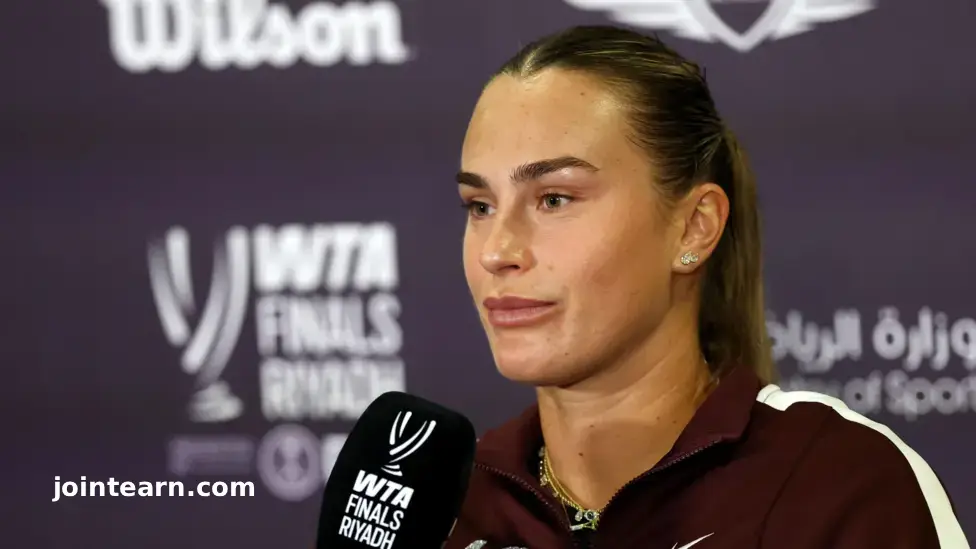
World number one Aryna Sabalenka has called on the four Grand Slam tournaments—Wimbledon, the Australian Open, the French Open, and the US Open—to “come to the table” amid growing pressure from top players for higher prize money and improved player welfare.
Sabalenka, who won her fourth major singles title at the US Open in September, is leading a coordinated effort among the top 20 men’s and women’s players to demand fairer revenue distribution and better protections for physical and mental health.
What the Players Are Asking For
The group of tennis stars has submitted individual proposals to each Grand Slam, focusing on three key areas:
1. Prize Money
The players are seeking a higher prize money-to-revenue ratio, reflecting the contribution of athletes to the financial success of tournaments. They argue that more money should trickle down the draws, benefiting mid- and lower-ranked players, not just the champions.
2. Player Welfare
The group is requesting contributions from the Grand Slams toward pension, healthcare, and maternity funds, a practice currently funded only by the ATP and WTA Tours with £60m annually. Players like Jannik Sinner and Casper Ruud argue that the majors should make a comparable contribution to protect athletes’ long-term welfare.
3. Greater Consultation
Players want a voice in major decisions, including scheduling, late-night finishes, and tournament structures. This would allow them to mitigate the physical and mental toll of a long tennis season with a short off-season.
“It has been a long time since ATP and WTA players worked together to influence decision-making,” said three-time major finalist Casper Ruud.
Why Players Are Speaking Out Now
Earlier this year, top players met with representatives of all four Grand Slams, including Sabalenka, Sinner, Coco Gauff, Alex de Minaur, and Madison Keys. Discussions initially appeared constructive, but players say talks have stalled, leaving them frustrated at perceived inaction.
The timing follows the Professional Tennis Players’ Association (PTPA) legal action citing “anti-competitive practices and a disregard for player welfare.” With stalled discussions, players have chosen to speak publicly to increase pressure on the majors and indicate they are willing to pursue further action.
Prize Money Disparity Compared to Other Sports
Players argue the Grand Slams’ current revenue sharing is insufficient. Sources estimate that the four majors distributed 12.5% to 20% of their revenue to players in 2024, though some insiders dispute these numbers, with the Australian Open reportedly offering 23%.
In comparison, athletes in major U.S. sports leagues—NBA, NFL, NHL, and MLB—receive between 40% and 50% of total revenue. The tennis players are proposing a staged increase over five years, eventually approaching the levels offered at leading ATP and WTA combined tour events.
American top-10 player Ben Shelton highlighted the gap in revenue-to-prize-money ratios between tennis and other major professional sports.
Grand Slams’ Response
The Grand Slam tournaments defend their current policies, citing increases in prize money and enhanced facilities:
- Wimbledon 2025 offered £53.55m in prize money, more than double 2014’s total.
- First-round prize money rose 128% over the past decade; qualifying payouts increased 309%.
- Doubles and wheelchair events have also seen significant prize enhancements.
“We remain open to constructive discussions to achieve the best possible outcomes for the sport and for our players and fans,” the All England Club told BBC Sport.
The Australian Open, French Open, and US Open have also engaged with players but are yet to outline further plans in response to the latest proposals.
Leading Voices in the Push for Change
Aryna Sabalenka, Jannik Sinner, Carlos Alcaraz, Coco Gauff, and Casper Ruud are among the stars at the forefront of the campaign. They argue that the majors, as pinnacle events in the sport, must take responsibility for long-term player welfare and equitable prize money distribution.
“The Slams are the top of our sport. I would just ask that they come to the table to have a conversation and see if we can find mutually beneficial solutions,” Sabalenka said.
The campaign has already sparked debate in the tennis world, raising awareness about the physical and financial challenges faced by players outside the top rankings.
Conclusion
As the tennis world prepares for another season of high-stakes competition, the dialogue between players and the Grand Slams is at a critical juncture. With top stars united in demanding change, the sport may be on the cusp of meaningful reforms in prize money distribution, player welfare, and consultation processes.
Whether the majors respond positively or the players escalate action remains to be seen, but one thing is clear: tennis’ biggest names are making their voices heard louder than ever.


Leave a Reply